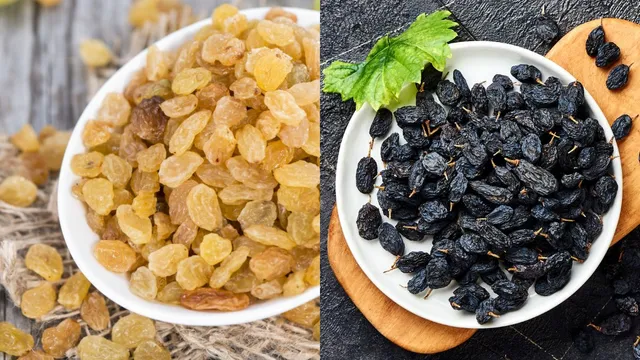- By Iram Hussain
- Wed, 20 Nov 2024 08:42 AM (IST)
- Source:JND
Kishmish (raisins) and munakka (dried grapes) are popular dry fruits that are often confused due to their similarities. They're consumed as snacks or used in traditional desserts and savoury dishes, adding sweetness and flavour. heir distinct flavours and versatility make them special. Munakka's slightly sweet and tangy taste contrasts with Kishmish's sweeter and juicier flavour. These dried grapes are staples in many cultures that add depth and richness to various culinary preparations.
Apart from their appearance, these sweet treats are also credited with a number of health benefits. Before exploring their benefits, let's understand the common difference between kishmish and munakka.
Difference Between Kishmish And Munakka
Kishmish and munakka are distinct dried grape varieties. Kishmish is seedless, soft and sweet while munakka retains its seed, offering a slightly crunchy texture and tangy flavour. Kishmish's sweetness is more pronounced whereas Munakka's flavour is complex. Texture and taste aside, their culinary uses differ. Kishmish suits desserts and snacks while Munakka complements savoury dishes and traditional remedies. These differences set them apart, making each unique and prized in various cultural contexts.
Benefits Of Kishmish
Kishmish contains antioxidants that combat free radicals and protect against cell damage, inflammation and oxidative stress, promoting overall health and well-being.
Kishmish serves as a natural sweetener, providing instant energy due to its high sugar and fibre content, making it an excellent pre-workout snack or healthy dessert option.
It also helps lower cholesterol levels, regulate blood pressure and prevent cardiovascular diseases due to its potassium, fibre and antioxidant content, thereby promoting a healthy heart.
The polyphenols and antioxidants in kishmish exhibit anti-inflammatory properties, reduce inflammation, alleviate symptoms of arthritis and promote overall immune function.
-1731999719045.jpg)
Kishmish or raising is a nutritious dry fruit (Image Credits: Canva)
Benefits Of Munakka
Munakka's rich iron content helps combat anaemia, fatigue and weakness, promoting healthy red blood cell production and maintaining optimal iron levels.
Its high fibre content regulates bowel movements, prevents constipation and supports healthy gut bacteria, ensuring smooth digestion and preventing digestive disorders.
Munakka's antioxidants combat free radicals, protecting against cell damage, inflammation and oxidative stress, promoting overall well-being and reducing chronic disease risk.
The potassium, fibre and antioxidants present in munakka help lower cholesterol, regulate blood pressure and prevent cardiovascular diseases, supporting a healthy heart.
ALSO READ: Difference Between Khajoor And Chhuhara: Which Is Good For Your Health?
ALSO READ: 6 Incredible Advantages Of Eating Raisins Everyday
(Disclaimer: This article is for informational purposes only. It is not a substitute for professional advice, diagnosis or treatment.)

